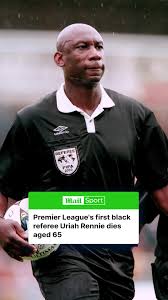The Career and Controversies of Uriah Rennie

Introduction
Uriah Rennie, renowned in the world of football as a referee, has become a prominent figure in discussions surrounding officiating in the sport. His remarkable career in the English Premier League and controversies that have arisen during matches he officiated make him a significant topic of interest for football fans and analysts alike. Understanding the impact of his decisions on pivotal matches adds depth to the ongoing conversation about the role of referees in sports.
Career Overview
Uriah Rennie was born on December 1, 1968, in Leeds, England. He began his refereeing career in the lower leagues of British football and quickly rose through the ranks due to his performance and decision-making capabilities. In 1997, he was appointed to officiate in the Premier League, where he gained a reputation for being both authoritative and, at times, prone to controversy.
Notable Matches
Throughout his career, Rennie has officiated in many crucial matches. One of the most talked-about was the 2003 encounter between Liverpool and Manchester United, where his decisions sparked debates among fans and pundits. Critics often pointed out that his interpretation of certain fouls could have changed the outcome of such high-stakes matches, making him a focal point of post-match discussions.
Controversies that Shaped His Career
Uriah Rennie’s career has not been without controversy. In 2005, a particularly contentious match between Chelsea and Manchester City saw him face severe backlash after disallowing a late Chelsea goal due to a perceived foul. This incident led to widespread public scrutiny and highlighted the pressures officiating can bring. On several occasions, his decisions led to calls for the introduction of technology in football to assist referees and ensure fairness in the game.
Retirement and Legacy
Rennie retired from officiating in 2009, leaving behind a mixed legacy. While many appreciate his commitment to the sport and his officiating skills, the controversies he experienced serve as case studies in the challenges referees face in high-pressure environments. His experiences contributed to ongoing discussions about referee support, training, and the implementation of technology such as VAR (Video Assistant Referee).
Conclusion
The influence of Uriah Rennie’s career extends beyond his on-field decisions; it reflects the evolving dialogue about officiating in football. As technology becomes more integrated into the game, the lessons learned from Rennie’s experiences could arguably lead to improvements in how matches are officiated. For fans, understanding the complexities of refereeing, exemplified by figures like Rennie, can enrich their appreciation of the sport and provoke thoughtful discussions on fairness and integrity in football.







